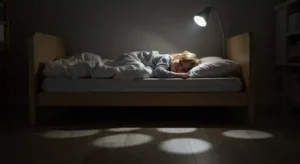Discover how staying active can improve sleep quality during middle age. Learn study findings, benefits, and practical tips for better rest. *Source: AASM*
Jumpstarting Better Sleep: How Fitness Protects Against Middle-Age Sleep Shifts
A long-term study tracked nearly 9,000 individuals over several years, using treadmill endurance tests to assess fitness. The results revealed a clear and compelling link between physical fitness and sleep quality:
Key Findings
- Fitness Decline Predicts Sleep Complaints:
As participants’ fitness levels dropped — marked by shorter treadmill times — they faced a higher likelihood of reporting sleep issues. - Quantifying the Risk:
For every minute lost on the treadmill endurance test: - Men had a 1.7% higher chance of developing a sleep complaint.
- Women saw about a 1.3% increase in risk.
Understanding the Treadmill Test: Measuring Fitness and Its Link to Sleep Health
How was fitness measured in this significant research? The investigators used what’s often considered a standard indicator of overall cardiorespiratory fitness: the treadmill endurance test. This test assesses cardiovascular health by evaluating how long someone can walk or run on a treadmill as it gradually increases in speed and incline.
Why measure fitness this way in relation to sleep?
1. Cardiorespiratory Fitness = Overall Health: Treadmill performance reflects a person’s general physical condition – a key determinant of overall health and aging well.
Shared Physiological Pathways: Being fit is associated with better-regulated hormones (like those governing sleep-wake cycles), reduced stress responses, and healthier cardiovascular function, all of which influence sleep.
Men and women showed a slightly different trajectory in this study (1.7% vs 1.3%), but the underlying principle holds for both: investing in fitness directly invests in sleep health during middle age and beyond.
The Takeaway: Prioritize Fitness for Better Quality Sleep
In essence, the evidence highlights that sustaining physical activity into middle age is a smart strategy for protecting your sleep.
Protective Effect: Inactivity heightens vulnerability to developing sleep complaints as we get older.
Quality over Quantity (of odds): While fitness won’t resolve every sleep issue, it demonstrably *lowers* the overall odds compared to a decline in activity.
Powerful Tool for Sleep Health: Exercise is a non-pharmacological approach with significant potential for promoting healthy sleep.
This reinforces the three pillars of health: nutrition, physical activity, and sleep.
Sleep Well, Be Well: Supporting your fitness journey is intrinsically linked to supporting your sleep quality and overall vitality.
Conclusion
Middle age often brings new challenges to energy, mood, and sleep — but the science is clear: staying physically active can make a meaningful difference. Fitness doesn’t just support your heart or waistline; it’s a direct investment in how well you sleep, think, and feel.
By maintaining regular exercise, especially aerobic activity like walking, jogging, or cycling, you help regulate your internal clock, reduce stress, and strengthen the systems that support deep, restorative sleep. Even small improvements in fitness can reduce your risk of developing sleep problems over time.
In short: move your body, protect your sleep — and give yourself the energy and clarity to thrive through every stage of life.
Frequently Asked Questions
How does fitness specifically affect sleep in middle age?
Maintaining cardiorespiratory fitness through regular activity can significantly reduce the risk of developing sleep complaints as we age. Longer treadmill endurance test times were linked to fewer sleep issues in a large study of middle-aged adults. Exercise helps regulate sleep patterns and may improve sleep quality naturally.
What types of exercise are best for improving sleep in middle age?
The most beneficial exercises focus on overall cardiorespiratory health. Activities like brisk walking, running, cycling, and swimming, performed consistently each week according to CDC guidelines, support better sleep. Any consistent active routine that elevates your heart rate contributes positively, but sustained, moderate-intensity exercise appears particularly helpful.
Sources
- Benefits of Exercise on Sleep: https://www.healthline.com/nutrition/how-exercise-can-improve-sleep-quality
- Exercise as a Natural Sleep Aid: https://www.mayoclinic.org/healthy-lifestyle/sleep/in-depth/exercise-and-quality/art-20048393
- Cardiorespiratory Fitness and Sleep Health: https://www.nih.gov/common-health-topics/sleep/exercise-helps-sleep








